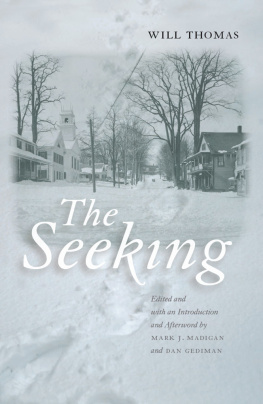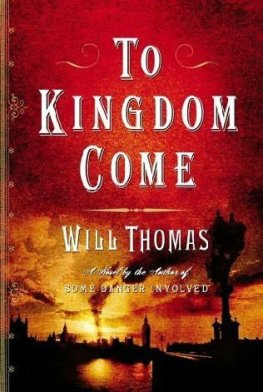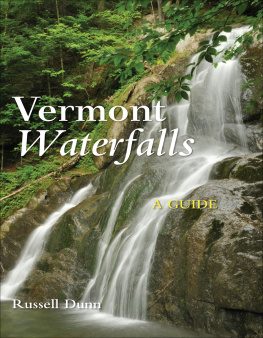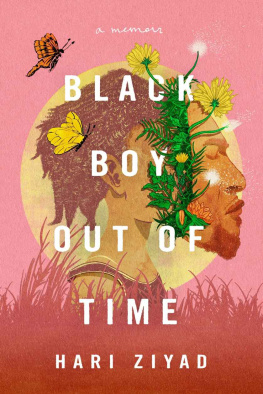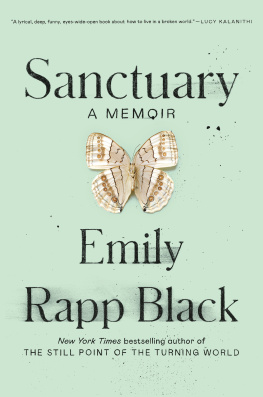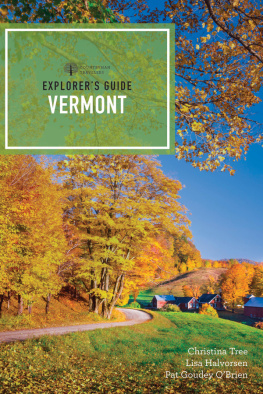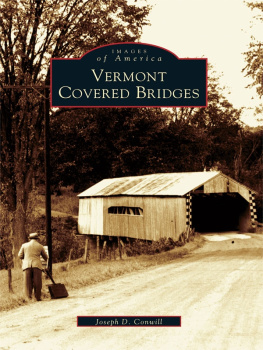Will Thomas - The Seeking
Here you can read online Will Thomas - The Seeking full text of the book (entire story) in english for free. Download pdf and epub, get meaning, cover and reviews about this ebook. year: 2013, publisher: Northeastern University Press, genre: Detective and thriller. Description of the work, (preface) as well as reviews are available. Best literature library LitArk.com created for fans of good reading and offers a wide selection of genres:
Romance novel
Science fiction
Adventure
Detective
Science
History
Home and family
Prose
Art
Politics
Computer
Non-fiction
Religion
Business
Children
Humor
Choose a favorite category and find really read worthwhile books. Enjoy immersion in the world of imagination, feel the emotions of the characters or learn something new for yourself, make an fascinating discovery.
- Book:The Seeking
- Author:
- Publisher:Northeastern University Press
- Genre:
- Year:2013
- Rating:3 / 5
- Favourites:Add to favourites
- Your mark:
- 60
- 1
- 2
- 3
- 4
- 5
The Seeking: summary, description and annotation
We offer to read an annotation, description, summary or preface (depends on what the author of the book "The Seeking" wrote himself). If you haven't found the necessary information about the book — write in the comments, we will try to find it.
Now back in print, the groundbreaking memoir of one of the first black families in Vermont
The Seeking — read online for free the complete book (whole text) full work
Below is the text of the book, divided by pages. System saving the place of the last page read, allows you to conveniently read the book "The Seeking" online for free, without having to search again every time where you left off. Put a bookmark, and you can go to the page where you finished reading at any time.
Font size:
Interval:
Bookmark:
The Seeking
OTHER TITLES IN
The Northeastern Library of Black Literature
EDITED BY RICHARD YARBOROUGH
Erin Aubry Kaplan
The Accidental Populist: Dispatches of a Black Journalista
Albery Alison Whitman, Ivy G. Wilson, ed.
At the Dusk of Dawn: Selected Poetry and Prose of Albery Allson Whitman
Frances Smith Foster, ed.
Love and Marriage in Early African America
Frank London Brown
Trumbull Park
Trey Ellis
Platitudes
Joanna Brooks and John Saillant, eds.
Face Zion Forward: First Writers of theBlack Atlantic, 17851798
John Edward Bruce
The Black Sleuth
Fran Ross
Oreo
Richard Wright
The Long Dream
Lawd Today [unexpurgated]
John A. Williams
Sons of Darkness, Sons of Light
Clarence Major
All-Night Visitors
Ann Allan Shockley
Loving Her
Sterling A. Brown
A Sons Return: Selected Essays
Jessie Redmon Fauset
The Chinaberry Tree
Lloyd L. Brown
Iron City
Wallace Thurman
Infants of the Spring
Andrea Lee
Sarah Phillips
Claude McKay
Home to Harlem
For a complete list of books that are available in the series, visit www.upne.com
WILL THOMAS
The Seeking
Introduction by DOROTHY CANFIELD FISHER
Edited, and with a New Introduction and Afterword,
by MARK J. MADIGAN and DAN GEDIMAN
Northeastern University Press
BOSTON
NORTHEASTERN UNIVERSITY PRESS
An imprint of University Press of New England
www.upne.com
Northeastern University Press edition 2013
by the Estate of William Thomas
Originally published in 1953 by A. A. Wyn, Inc., New York
First Northeastern University Press edition 2013
All rights reserved
For permission to reproduce any of the material in this book, contact Permissions, University Press of New England, One Court Street, Suite 250, Lebanon NH 03766; or visit www.upne.com
Library of Congress Control Number: 2013941809
ISBN 978-1-55553-827-9
ISBN 978-1-55553-828-6 (e-book)
to Helen
INTRODUCTION TO THE NEW EDITION
Mark J. Madigan
SOME WRITERS, AS THE SAYING GOES, need no introduction. Will Thomas is not one of those writers. Unless you are a specialist in African American or Vermont literature, you have probably never heard of him. The author of one novel, God Is for White Folks (1947), and an autobiography, The Seeking (1953), Thomas faded into obscurity soon after their publication. In this introduction you will find information on the life and literary career of an unduly forgotten writer. For the lifeblood of his story, I invite you to read The Seeking.
Born on November 19, 1900, in Kansas City, Missouri, the authors full name was William Madison Thomas, Jr.
Confirming his mothers fears, Thomas experienced the implications of racial difference in Kansas City. As racial epithets were directed at him by his white peers, he quickly learned his own racist retorts and eventually participated in a racial gang fight. Upon the latter, he reflected, When that day began, I was but a boy. At its end I had become a Negro boy, and as such, for the first time, troubledly glimpsed walls which, like morning mists, arose between people different in something called race. Little did he know the extent to which the walls of race would preoccupy his mind and trouble his soul from that day forward.
Thomas stayed in Kansas City until age eighteen, when he left to attend Lincoln University of Pennsylvania (his stepfathers alma mater). After his first year, he dropped out, claiming the historically African American institution seemed like an exercise in self-chosen segregation.
Tiring of journalism, the peripatetic Thomas moved to Los Angeles in the late thirties, where he worked in advertising. He completed a novel manuscript during this period, but was unsuccessful selling it to a publisher. He was sure the reason was that the plot centered on an interracial love affair. Discouraged, he moved on to other literary projects, including writing for pulp magazines, ghostwriting a biography, and scriptwriting. In Los Angeles, he met his future wife Helen Chappel, a reporter for the California Eagle, with whom he would have three children: Anne, William, and Bradley.
It was also in Los Angeles that Thomas met Chester Himes, the celebrated detective novelist. As Thomas recounts, the two writers became acquainted soon after their wives met in the early 1940s. Thomas was encouraged to learn that Himess racially-charged protest novel, If He Hollers Let Him Go, was under contract to Doubleday Doran, a major publisher. Himes read Thomass novel manuscript and liked it enough to give to an editor he knew, but no sale developed. Nevertheless, Himess enthusiasm prompted Thomas to put his manuscript back into editorial circulation. It was eventually accepted by Creative Age Press, a small New York house that specialized in books on spiritual and psychic subjects, but also published general titles.
Thomass contract called for his manuscript to be developed into a three-novel trilogy.
God Is for White Folks received mixed reviews, and sales appear to have been modest at best. Thomas thought the book might have done better had it not been for the publication of Sinclair Lewiss Kingsblood Royal, another novel on the theme of passing and racial identity, earlier in 1947.
Prior to Creative Ages acceptance of God Is for White Folks, a readers report from another publisher nearly sent Thomas into exile from the United States. The reader wrote, With proper revisions this would make a quite satisfactory novel. It is certainly publishable. I would not press for our doing it, however, because... I do not see a very promising future for a writer who would probably continue to base his writings upon Negro more than human situations and Thomas found the differentiation between Negro situations and problems and human ones abhorrent. As he explains in The Seeking,
Looking back, this episode probably marked the point at which I really gave up on my native land, for it occurred to me that my every major contact with life had been in one way or another spoiled by the poison of race prejudice of a kind against which it was impossible to defend.
And I wondered sadly if that was a Negro situation, a purely Negro problem, completely unrelated to those who had created it, and therefore not a matter of interest to them or anyone else.
Thomas thereafter resolved to move his family to Haiti, which was touted as a paradise in the popular press in the mid-forties. In 1946, the year he planned to emigrate, a Time magazine article presented an alluring view of life for American expatriates on the island republic: On porches overlooking the improbable blue harbor of Port-au-Prince, the 200 or more members of the American colony in Haiti basked in a New World Majorca, living like nabobs on $300 a month, and comfortably on $150. Consequently, instead of Haiti, he moved to Vermont.
Thomas could not entirely explain why he chose Vermont, but his decision to relocate there was informed by the states historical opposition to slavery and its proximity to Canada. Or are the men merely curious and well-intentioned? The process of answering these questions is the main substance of Thomass autobiography.
The genesis of The Seeking began with a letter Thomas wrote to the editor of the Chicago Defender in late 1948. Responding to a derogatory comment about Vermont by actress Faye Emerson Roosevelt, Thomas defended the state and its citizens. Because it adumbrates
Next pageFont size:
Interval:
Bookmark:
Similar books «The Seeking»
Look at similar books to The Seeking. We have selected literature similar in name and meaning in the hope of providing readers with more options to find new, interesting, not yet read works.
Discussion, reviews of the book The Seeking and just readers' own opinions. Leave your comments, write what you think about the work, its meaning or the main characters. Specify what exactly you liked and what you didn't like, and why you think so.

